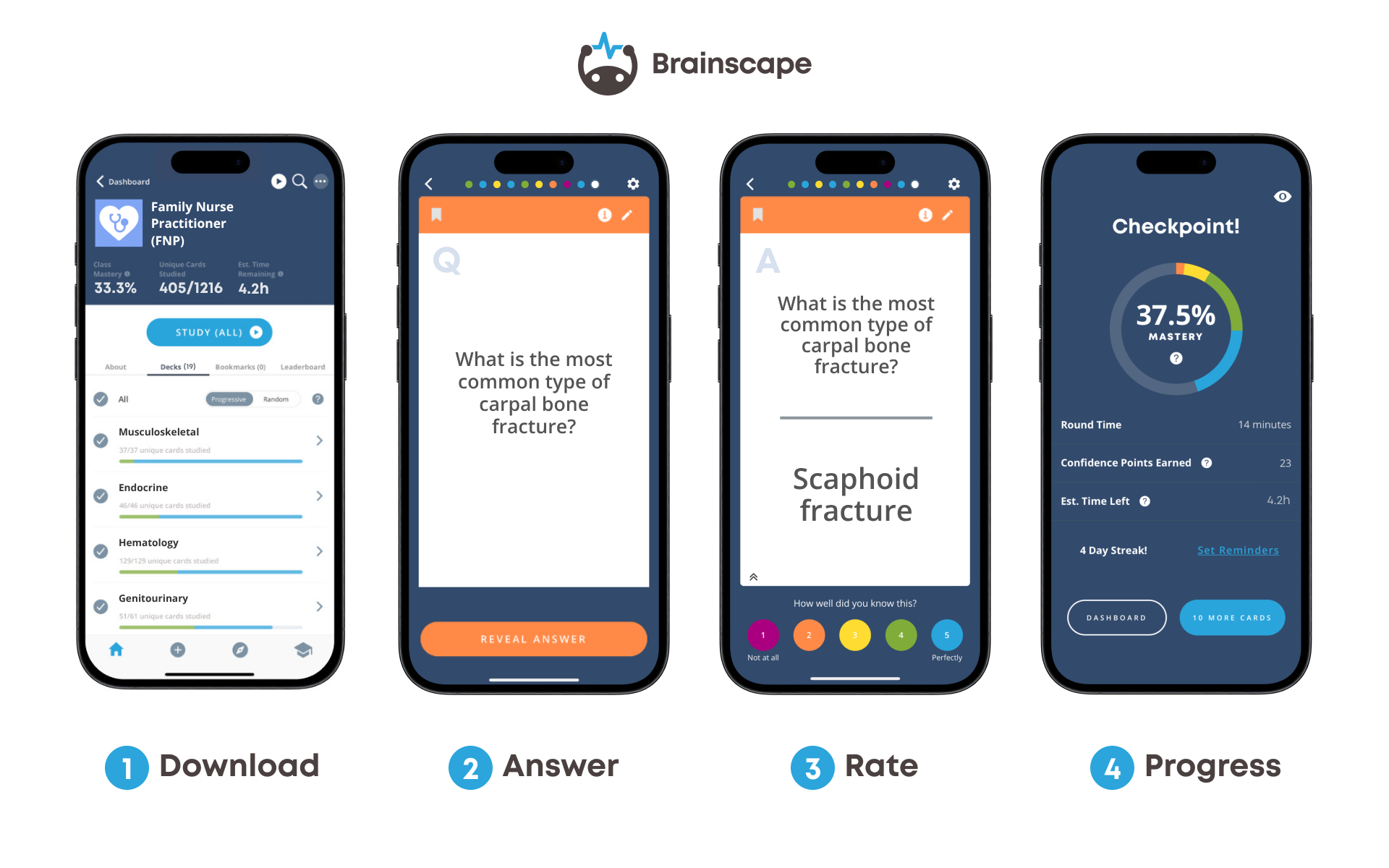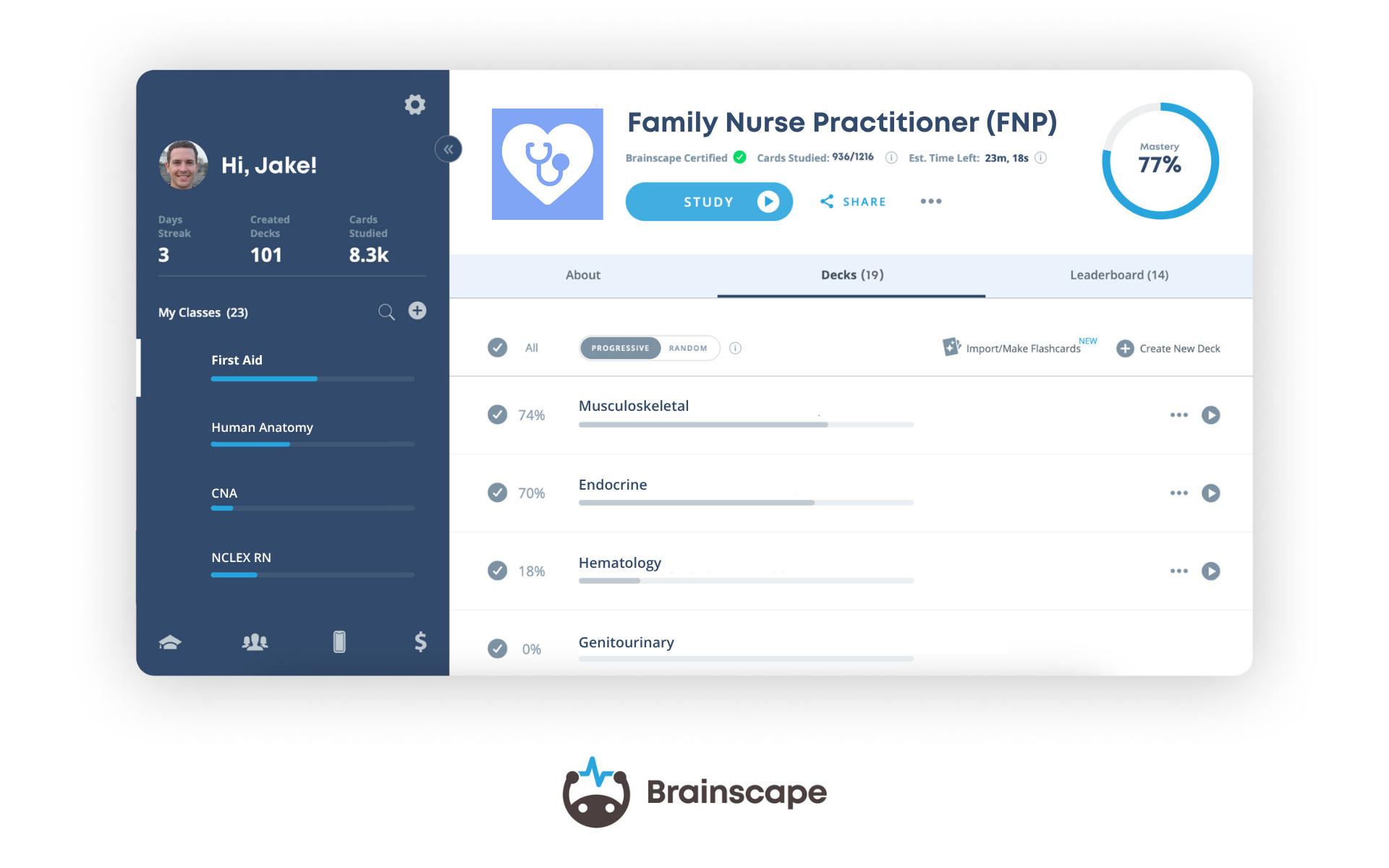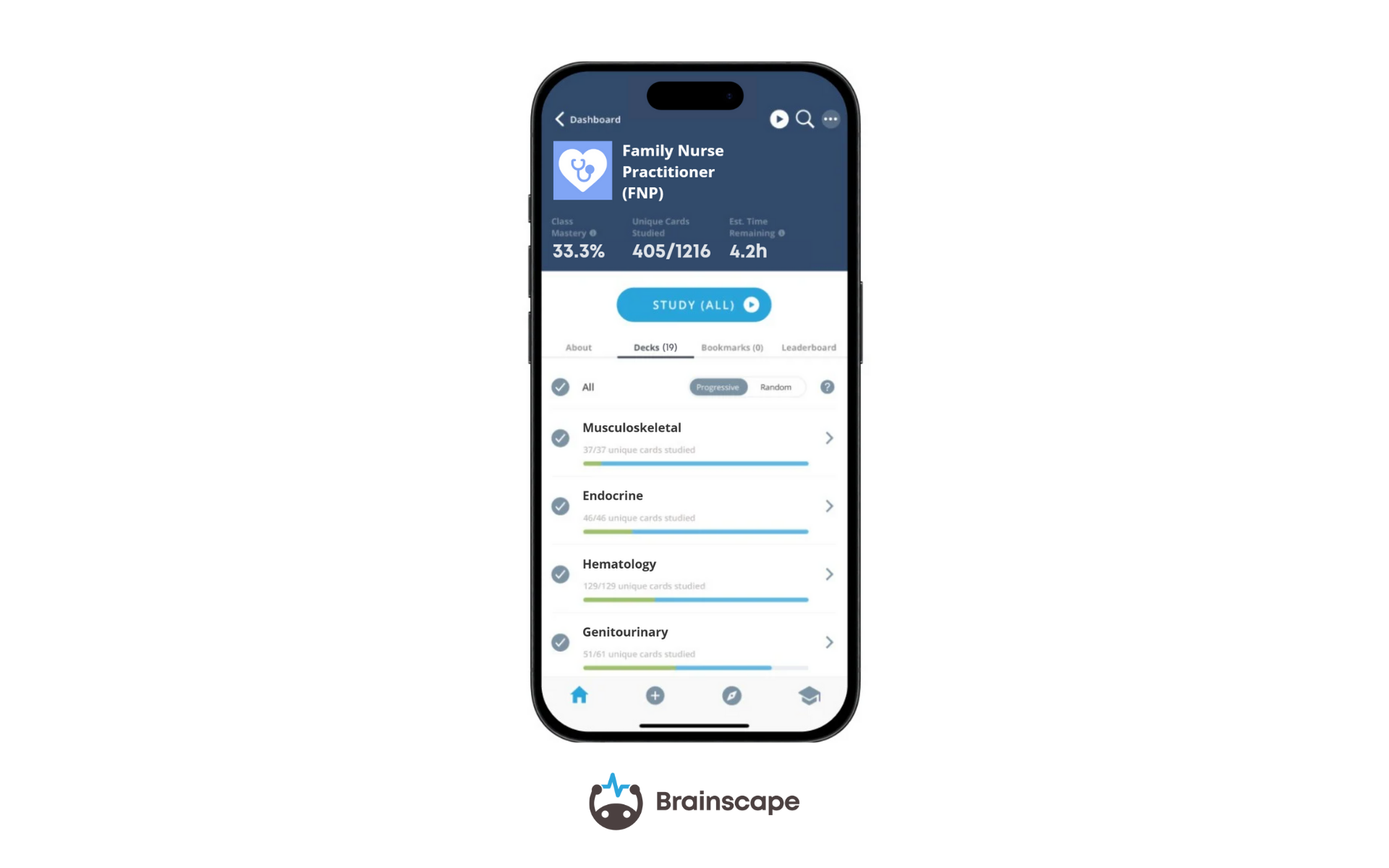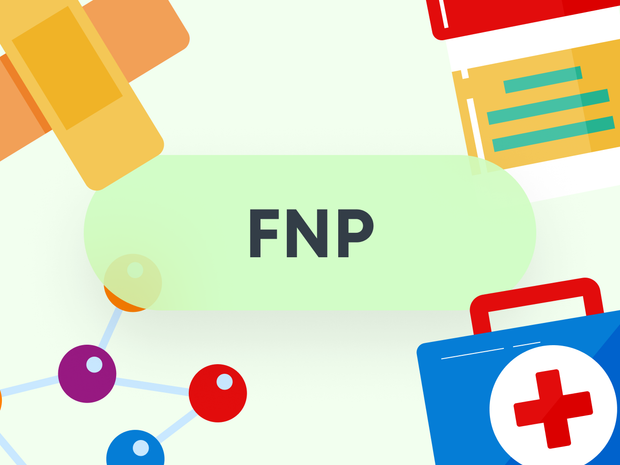Becoming a Family Nurse Practitioner (FNP) is a major milestone. You’ve already put in the years of nursing education, clinical rotations, and late nights writing care plans. Now the only thing standing between you and advanced practice is the certification exam.
The good news? With the right strategy, you can prepare for either the AANP or ANCC FNP boards efficiently and confidently. This FNP study guide walks you through the best study methods, grounded in evidence-based learning science, to help you master the material without burning out.
AANP Vs. ANCC: Which FNP Exam Should You Take?
One of the first questions FNP candidates ask is: Which exam should I choose? Both are respected, both lead to licensure, but they do have subtle differences:
- AANP (FNP-C): 150 multiple-choice questions, 3 hours. Focuses heavily on clinical knowledge across the lifespan.
- ANCC (FNP-BC): 175 questions, 3.5 to 4 hours. Includes not only clinical management but also professional role, ethics, and policy. In addition, the ANCC exam may feature question formats beyond standard multiple choice, such as multiple response or drag-and-drop.
Factors to consider:
- If you want an exam that’s purely clinical, the AANP may feel like a better fit.
- If you’re comfortable with professional issues and want ANCC’s broad recognition in academia and policy roles, the ANCC might suit you.
- Check your state licensure requirements: both are widely accepted, but some employers or regions have preferences.
Bottom line: you can’t go wrong with either. Either way, you’re qualifying for a position in one of the fastest-growing occupations in the United States. Choose based on your comfort level with content, your long-term career goals, and the testing style you prefer. Now, let’s take a step-by-step walk through the best way to study for your FNP boards…
Step 1: Create A Personalized Study Schedule
The number one mistake candidates make is winging it. The FNP exam covers a lot of ground, and without structure, you’ll quickly feel overwhelmed.
Start by:
- Mapping the exam domains (assessment, diagnosis, clinical management, health promotion, professional role).
- Assigning weekly focus areas (e.g., Week 1 = pediatrics, Week 2 = adult chronic conditions).
- Mixing review and practice daily, instead of waiting until the end for mock exams.
To help you plot out a robust study schedule, grab a free, customizable study schedule template and tailor it to your timeline. Whether you’ve got 12 weeks or 6, a clear roadmap keeps you on track.
Step 2: Review Content In Chunks Without Burning Out
Trying to cram an entire Leik review book in a weekend is a recipe for burnout. Instead:
- Study in chunks: Assign 1 to 2 topics per day (e.g., “diabetes pharmacology” or “childhood asthma”). That lets you make steady progress without overwhelming your brain.
- Set a realistic pace: Aim for 60 to 90 minutes of focused study daily, not marathon sessions. The best study session duration is the one you can complete day after day.
- Avoid overload: Add new material gradually, leaving room for review. Otherwise, you’ll just be pushing information through your brain without any space to let it take it root.
This technique aligns with how your brain consolidates long-term memory: exposure in manageable pieces, with repeated reinforcement.
Step 3: Reinforce With Digital Flashcards

Here’s where things get efficient. Adaptive digital flashcards with a spaced repetition algorithm are one of the most powerful tools for mastering clinical guidelines, drug classes, and lab ranges. And if you can find already-made, expert-vetted flashcards for the FNP exam, like the ones offered by Brainscape, that’ll save you even more time making them yourself.
- Why they work: Flashcards tap into three powerful cognitive learning techniques to help you learn the way your brain was biologically wired to learn: active recall (forcing your brain to retrieve information from scratch), spaced repetition (reviewing concepts at optimal intervals), and metacognition (rating how well you knew each concept afterwards). Combined, these lead to significantly faster learning and improved scores on medical exams.
- How to use them: Spend 20 to 30 minutes daily cycling through high-yield Q&As. (Digital flashcard apps like Brainscape and Anki will automatically show you the concepts you need to see at the right intervals, based on your unique strengths and weaknesses.) And the great thing about flashcard apps is that they fit perfectly into commutes, lunch breaks, or end-of-day wind-downs!
- Which tools: Platforms like Brainscape, Anki, or Quizlet offer digital flashcards. Brainscape and Anki use fully adaptive spaced repetition algorithms, while Quizlet provides adaptive practice modes. Any of these can help you stay consistent on both web and mobile.

Step 4: Take Timed Practice Exams
Flashcards help you memorize the facts, but mock exams help you prepare for the actual experience of passing the exam.
- Start untimed: In your early weeks, focus on accuracy and rationales.
- Move to timed sets: By mid-prep, complete blocks of 25 to 50 questions under exam conditions.
- Do full-length simulations: In the final 2 to 3 weeks, take at least one full-length mock to practice pacing (about 1.2 minutes per question).
When reviewing, don’t just note what you got wrong. Ask:
- Was it a knowledge gap? (If so, create flashcards for that concept to review it later.)
- Was it a test-taking error (misreading, rushing)? (If so, adjust your pacing strategy.)
And keep going! You’ll get better with practice.
Bonus Tips For Smarter FNP Prep

- Interleaving practice: Mix topics (peds + adult + women’s health) instead of block studying: this is proven to hasten recall.
- Peer accountability: Study with a classmate or online group to stay motivated. Make sure you focus group time on concepts you’re struggling with and questions you have, rather than studying topics from scratch.
- Lifestyle prep: Protect sleep, eat well, and exercise lightly: your brain encodes memory best when your body is balanced. (Many students ignore this aspect of exam prep, but it is crucial! Just think about how a healthy lifestyle can help a patient heal much faster!)
- Simulate exam day: Practice in a quiet room, no phone, timed strictly. Build test endurance like training for a marathon. This will not only help you get through everything in the allotted time but will also help to address exam anxiety.
Popular Questions About FNP Exam Prep
How Many Months Should I Study For The FNP Exam?
Most candidates study for the FNP exam for 8 to 12 weeks if already working full-time, or 12 to 16 weeks if balancing work, family, or other commitments. Adjust your timeline based on your baseline knowledge, and choose a realistic schedule that allows you to cover all the content.
Should I Study Differently For AANP Vs ANCC?
Yes, you should study for the AANP and ANCC differently. The ANCC includes professional role/policy, so dedicate extra time there. For AANP, weight your prep more toward direct clinical questions.
What Are The Hardest Topics On The FNP Exam?
Pharmacology (especially drug classes/contraindications), pediatrics, and women’s health often top the list in terms of difficulty. FNP Candidates also find professional roles challenging on the ANCC.
Do I Need Both A Review Book And A Qbank?
Not strictly, but most successful test-takers use one comprehensive text + one practice question source. The combo reinforces knowledge and exposes you to question styles.
How Do I Balance Studying With Rotations Or Family Responsibilities?
Plan for short, daily bursts instead of relying on long weekend cram sessions. Even 30 minutes of flashcards per day adds up to hundreds of reinforced concepts by exam week.
A Final Word On Your Nursing Certification
Preparing for the FNP boards doesn’t have to be overwhelming. With a structured schedule, daily reinforcement using adaptive digital flashcards, and timed practice exams, you’ll build knowledge and confidence step by step.
The boards are a gateway to a rewarding career in advanced nursing practice. Treat your prep like a marathon, not a sprint. If you build a steady, manageable plan and stick to it, when test day comes, you’ll walk in ready to pass on the first attempt.
Additional Reading
- The Best Apps For Nurses & Nursing Students In 2025
- Does It Matter Which Nursing School You Attend?
- How To Get A Job In Nursing
References
Deng, F., Gluckstein, J. A., & Larsen, D. P. (2015). Student-directed retrieval practice is a predictor of medical licensing examination performance. Perspectives on Medical Education, 4(6), 308–313. https://doi.org/10.1007/s40037-015-0220-x
Family nurse practitioner (FNP). Family Nurse Practitioner (FNP)- AANPCB. (n.d.). https://www.aanpcert.org/certs/fnp
Family nurse practitioner certification (FNP-BC): ANCC. ANA. (1980, January 1). https://www.nursingworld.org/our-certifications/family-nurse-practitioner/
Kerfoot, B. P. (2010). Adaptive spaced education improves learning efficiency: A randomized controlled trial. Journal of Urology, 183(2), 678–681. https://doi.org/10.1016/j.juro.2009.10.005
Media, S. (2025, March 17). What is a family nurse practitioner (FNP)? and how to become one: USAHS. University of St. Augustine for Health Sciences. https://www.usa.edu/blog/what-is-an-fnp/
